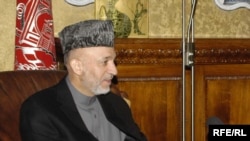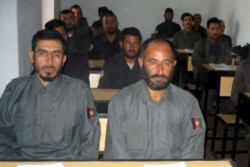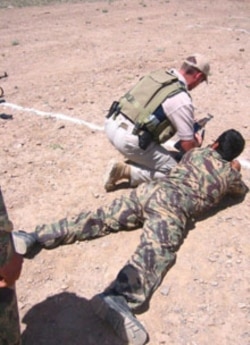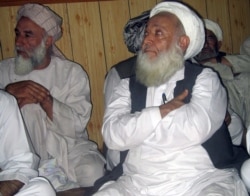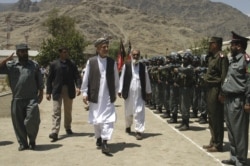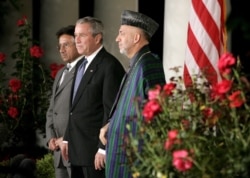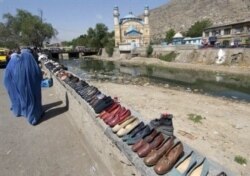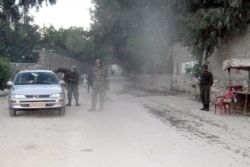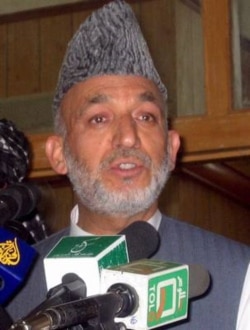RFE/RL: Mr. President, the people of Afghanistan have different concerns. So far as we know and read in the reports, security is the top concern of the Afghan people. In the past 18 months, the security situation in the southern and eastern provinces -- even in the Tagau and Nejrab areas close to Kabul -- has deteriorated. From your point of view, why has the security situation become so bad? Why are the opponents of the central government attacking and committing suicide bombings?
Hamid Karzai: In the name of God the all merciful and forgiving, without doubt the security situation in Afghanistan in the past 1 1/2 to two years has deteriorated. And there are different reasons for this. This situation also is a cause of concern for us. One reason is that our security forces in different areas and districts -- and particularly in those areas where we are facing attacks -- are very weak. Two or 2 1/2 years ago, the people of Kandahar informed me, and the people of Helmand informed me, that the police forces in the districts are very weak. Their numbers are limited and they are not well-equipped.
I started talking with the international community about it and tried to get more support for our police forces. At first, it was decided that the number of police in the [Afghan National Police] force would be 62,000. We told the foreigners that the material and financial support that they are offering is limited and should be increased. We told them that the amount of support is not enough to train so many police. These discussions continued for a long time. Finally, six months ago, the international community was convinced that our security forces in the districts are, indeed, very limited -- and that they would give us more support in this regard.
And so it was decided that we hire local people in the districts and train them to be police because this is our tradition -- that people take care of their own security. In this way, the number of police was increased from 62,000 to 82,000 people. Furthermore, it was decided that the income of these people would be increased and that they would be given better equipment. This means we have increased the size of our police force by 20,000. This means it was our own weakness -- the weakness of our system and the weakness of our government. We did not have enough police and our police were not trained.
RFE/RL: And all these efforts caused new problems and people began complaining that you have created new militia forces. Is that correct?
Karzai: Yes. While we were talking with the foreigners I told them that if you don't agree very quickly, we will be exposed to attacks. People are crossing our borders. They burn our schools. They kill our children. They destroy our houses and assassinate our clerics and our tribal leaders. So [I told the international community] if you don't agree with me soon to raise the number of our police and give them better training and equipment, then I will be forced to use local measures. Local measures means that I invite the local elders and ask them for their help -- to send their young people to defend the country. The foreigners had the impression that we were going to create local militia forces. The fact is that the Afghan people don't like militia forces at all. But the foreigners didn't realize this. They couldn't differentiate between the local people and the militia forces. This was the first reason.
The second reason is that Afghanistan over the past 30 years was always faced with foreign interference -- the meddling of the neighboring countries. Little by little, Afghanistan lost its sovereignty. Every neighboring country had its own interests and their own people in Afghanistan. And Afghanistan itself had no voice. It appeared that Afghanistan was an independent country. But in reality, it wasn't independent at all.
When the new government was established, when the international community entered Afghanistan, and when Afghanistan stood again on its own feet in the international arena as an independent and respected country, those elements who were supported by foreign [neighboring] countries -- and were governing this country and were abusing this country -- it was hard for them to accept the new realities. [It was hard for them] to tolerate a new and independent Afghanistan with its own identity and flag and whose leaders would appear as the equals of other leaders in the world and delivering speeches like the leaders of the rest of the world.
So in order to weaken this development and progress, to end the improvements that were introduced to the life of this country and change Afghanistan back to a country that they could govern again, they started sabotage acts in our country. So they sent their bombs, their destructive weapons, and most of all, they used our own sons -- those who were uneducated and poor. With lots of tricks and hypocrisy, they deceived our sons and sent them back to Afghanistan to fight against us. They started broad propaganda. For example, in neighboring Pakistan they are creating propaganda that there is no Islam in Afghanistan -- that there is no call to prayer in Afghanistan. And, God forbid, they are saying that there are only infidels in Afghanistan and that Afghanistan is not moving toward progress and prosperity. [They say] that the Afghan people are becoming hungry and facing calamity.
From the other side, our own publicity was very weak. So, to make it short, I can tell you that the first reason was foreign meddling, terrorism, and the creation of fear in Afghanistan. This means the foreigners were training extremists and terrorists against us and making negative propaganda against us. The other reason was our own internal weakness.
RFE/RL: Mr President, you mentioned that foreign countries -- especially Pakistan -- are meddling in the internal affairs of Afghanistan and that they are using Afghan youth to carry out terrorist attacks against Afghanistan. Recently, you said that you invited [former Taliban leader] Mullah Mohammad Omar and [former Prime Minister and head of the Hizb-e Islami] Gulbuddin Hekmatyar for talks. You said that if they are ready for talks, that you would open a dialogue with them. This happened at a time when the chief of Afghanistan's Peace and Reconcilliation Commission, Sebghatullah Mujaddedi, called Hekmatyar a murderer. And the international forces call these people terrorists. The people of Afghanistan are asking how this can happen. What is your comment on this?
Karzai: Mr. Mujaddedi said that these people can come and talk. And we are ready to talk about peace with them. But the government of Afghanistan and the Peace and Reconcilliation Commission cannot take responsibility for their past or for what they have committed. Rather, the people of Afghanistan and the parliament should make the decision about what they have done in the past. So it is up to the people and the parliament to decide whether to forgive them or not.
RFE/RL: Some of your opponents claim that the agreement between the government and the tribal elders of the Musaqala District of Helmand Province is a compromise with the Taliban. What is your reaction to this?
Karzai: This is really an important issue. There are some suspicions in society about this. And these suspicions should be removed. Two or three months ago, the governor of Helmand Province approached me and said that the British forces want to leave this area. [He said] the elders of this district told the [provincial] government that they have problems with air strikes and military operations -- which were really going on there. These people suggested that they will ask the Taliban to stop their operations in this district. The elders said that the Afghan government should also do something so that the Taliban would not have any reason to carry out attacks in this district. These elders had drafted an agreement. [The governor of Helmand said that] he, himself, had read that agreement. And then [the governor] added that some tribal leaders and elders want to see me.
So they came [to Kabul] at the beginning of the month of Ramazan. And I talked with them. Afghanistan is fundamentally a democratic country. Our life is based on jirgas [councils] and talking with tribal elders. In every part of our country where the elders, the tribal leaders, and the religious leaders who guide society all cooperate, there is peace and the government will function. If they do not cooperate, then nothing will work. It is like this in every democratic society in the world. So I am deeply convinced that the people could organize their lives better and advance their situation and bring peace to society. If they want this, they can achieve it. That is the reason that I accepted the advice of these tribal elders.
So I agreed with them and I told them: 'Fine. Do your preparations. But the schools must remain open. There should be peace and the local police will be trained and sent to your districts.' The elders [of the Musaqala district] promised me that there will not be any saboteurs allowed in this district. They said they would return to Musaqala and see how things work. They said that if things are not working, they would let me know. Later, they sent me a video from there. The video showed that they had convened a big meeting there. It was a big jirga. And the elders and the tribal leaders spoke at this jirga and they said in their speeches that they want peace. They don't want destruction. And they said they will not let those who destroy Afghanistan enter their district. These elders asked the government for more help in reconstruction. They asked for the reconstruction of their mosque. And we accepted all of that.
This means that I trust everything these elders say. I trust them and I accept them. They are the true sons of this country and they are more faithful than anyone else in this country. But I have received two reports recently. One report says that a very respected religious leader named Nurul Haq Akhundzada has been threatened by people who seem to be Taliban, or are Taliban. They have not only threatened him, but also humiliated him. I talked about this with the governor [of Helmand]. And now, I am going to talk about this with the elders who have come to Kabul again. Another tribal leader has disappeared. These two incidents need to be investigated. If it is proven that the Taliban entered this district and have committed these crimes, in that case, there will be lots of suspicion about this agreement. And the elders of this district should answer to me about why this has happened. There should be peace in that district and the rule of law should be practiced. There should be governmental institutions and the constitution of Afghanistan should be implemented. If that is not the case, then there will be doubts about this agreement. In that case, the government will be forced to intervene and get rid of these destructive elements.
RFE/RL: Now that we are talking about the security problems in the southern part of Afghanistan, I'm sure that in your private discussions with NATO that you have asked them to bring some changes to their strategies to avoid the killing of innocent local people. However, this has not been done. Rather, the number of civilian deaths have increased. Even recently, many innocent people were killed in Helmand Province. How can this be avoided?
Karzai: Yes. Unfortunately, in this war against terrorism, ordinary Afghans have suffered a lot. They were sacrificed and they tolerated a lot of suffering. After the tragedy of September 11[, 2001] in New York, when the international forces entered Afghanistan and started the war against terrorism, we began to say that this war is in our interest because the people of Afghanistan wanted to free themselves from the visible and invisible foreign occupation, from the the calamity of terrorism, and from foreign interference. This was the reason that we have joined hands with the international community.
The terrorists not only occupied us -- they killed our people, martyred our sons, burned our vineyards, destroyed our villages and towns, and tried to create hostility among the people of our country. They also were humiliating our history and our cultural identity. So it was very important for us that a force enter this country and help to save us. This was the reason that the Afghan nation decided to join hands with the international community and that we cooperated with them. This was also the reason that we accepted a very high number of sacrifices. Many parts of our country were bombarded. In different operations of the war against terrorism, many houses were destroyed. But the people accepted all this.
Now, the more progress we make and the more our system is established, the degree of our tolerance toward terrorist activity is decreasing. This means that we expect such terrorist activities will decrease. And that is the reason that we, for the past 3 1/2 years -- if not every day then certainly on a weekly basis -- discuss the issues of terrorism with the international community. And to find out how we can lower the threats of terrorism in this country. It is normal that in antiterrorism operations there are casualties. But we are trying very much, by developing and using new mechanisms, to avoid casualties. Many things have decreased. For example, the number of searches of Afghan houses [by coalition forces] has gone down. And many other problems are being reduced. But it is true still that air strikes are killing people. We have asked [NATO and the United States] to avoid such casualties.They are also trying very hard. We all try our best to reduce casualties as much as possible. Especially through air strikes. But this can only happen if, instead of looking for terrorists on Afghan soil, we look to the real sources of terrorism -- which is outside of Afghanistan -- and get rid of them. Afghanistan proposed this long ago -- that we should look for the real sources of terrorism outside of the country. We once again propose that we should go to the real sources, to the places where the terrorists get their financing, to the places where they are getting their training. There are no terrorists in Afghanistan. There are no extremists or destructive people in this country. Yes, there are thieves. It is true that there are insecurities because of criminal activities there. But we don't have terrorists in Afghanistan. And we hope that the international community will focus on the real sources of terrorism.
RFE/RL: It is good that you mentioned the real source of terrorism. Many people think that it is Pakistan. But in recent days, and particularly on November 8, there was a big suicide attack against recruits at a military training center in Pakistan. There was also an explosion in Quetta, Pakistan. Is this a result of the actions and reactions of terrorist groups?
"The interests of Afghanistan lie in a progressive, stable Pakistan. And the interests of Pakistan are in a stable and progressive Afghanistan."
Karzai: I am not saying that. The Afghan government does not say that the source of terrorism is in Pakistan. No matter where the source of terrorism is, the Afghan government says that the world should [support us]. A lot has been done in this regard. And we have reached agreements. Wherever the source of terrorism is, wherever the terrorists are financed, we should stand against them. If these centers are in Afghanistan, the world should come and tell us. You see that [NATO and coalition forces] go out every day in Afghanistan in search of terrorists. But if these centers are in Pakistan or in another country, then we should approach those areas and take measures to stop them. I am very sorry about the events [of November 8] in Pakistan that caused the deaths of 42 Pakistani soldiers in a suicide attack. This must show us very clearly that this campaign, this jihad against terrorism, is the duty for all of us. And we should fight this jihad together.
I have told the government of Pakistan -- my brother, the president of Pakistan, Mr. [Pervez] Musharraf -- that Afghanistan is a brother of his country. Afghanistan is his friend and his partner. And the interests of Afghanistan lie in a progressive, stable Pakistan. And the interests of Pakistan are in a stable and progressive Afghanistan. So let us join hands and save Afghanistan and Pakistan from this evil. I am hopeful that the jirga I have proposed -- which will be convening between the people of both countries -- will investigate the roots of all the evil and get rid of terrorism. So we are hoping the jirga will reach this conclusion. Afghanistan is looking for a solution and knows that there is no other way than to destroy the roots of terrorism. Superficial measures today or tomorrow cannot rid us of this problem. We should go to the root cause of extremism that brings about terrorism and get rid of it.
RFE/RL: You mentioned an interesting point -- the jirga between the tribal elders on both sides of the so-called Durand Line. The majority of people in Afghanistan do not know exactly what this proposed jirga is about. Can you please explain it to the people of Afghanistan what its purpose is and what you want to achieve?
Karzai: The purpose of convening this jirga is quite clear. It is to bring peace to the region. To bring peace to Afghanistan and Pakistan. As a result of that, peace will be established in the whole region and terrorism will disappear. The purpose is that no explosions take place in Afghanistan which cut our young boys into pieces. Why did I propose this jirga?
RFE/RL: So it was your proposal for this jirga?
Karzai: Yes. I proposed this jirga in Washington during a formal dinner party that was organized by President [George W.] Bush for myself and President Musharraf. I made the proposal there to convene such a jirga.
Why did I propose it? Five years ago, when the foundations of the new Afghanistan were laid down, life returned. Hope returned to the people of Afghanistan. But at the same time, there were also problems. What we wished was to be able to live in peace inside our country and in peace with our neighbors. But our wishes did not materialize the way we expected -- that the removal of the Taliban and Al-Qaeda would bring an end to terrorism. In defeating these elements, our hope was for absolute peace in Afghanistan. We hoped that the mothers and sisters of Afghanistan would be free from bombs and attrocities and war.
But unfortunately, it did not happen that way. There was peace all over Afghanistan. But in areas that lie close to the border of Pakistan, those provinces faced dangers again after one or two years. Again, they were faced with war. So we started talking about this with the world community, with the neighboring countries, and particularly, with our brotherly country Pakistan. I have visited Pakistan five or six times and there, during my first meeting with the president, he said at a press conference that Pakistan apologizes for any mistakes it may have made. And I told him in response that the Afghan nation thanked the nation of Pakistan -- that Pakistan had taken us in its arms and allowed us to live for 30 years in the country as refugees. We did live there for many years under good circumstances. The nation of Pakistan honored us and treated us like their brothers. They opened the door of their soil to us. They opened the doors of their houses where we lived. We started our jihad [against Soviet occupation] from Pakistani soil and they cooperated with us. So we thank Pakistan for all of that. We want to improve our lives and live with each other in a peaceful and brotherly atmosphere.
Unfortunately, that peace and prosperity that we wished for did not materialize. In less than two or three years, at least 2,000 of our people have been martyred. My government and I, in order to avoid such casualties, worked very hard. I talked with America. I talked with the United Nations, with European countries, with NATO, and with our neighboring countries. I went to every country [that I could]. I talked to China, to Islamic countries, to Arab countries, and to Pakistan. There have been five or six rounds of negotiations. Different delegations have been sent at different levels. But the result that the Afghan people wanted has not been achieved so far.
So, at the meeting of the president of the United States with myself and the president of Pakistan, I decided to present specific proposals. And one of these important, specific proposals was the convening of a jirga. And this was a demand of the Afghan people. Three months before that, I met with the representatives of all the provinces of Afghanistan. At that meeting, it was [first] proposed that we should convene such a jirga in order to find a way to bring an end to the war and to the destruction -- a war that is going on but which we do not know where it is coming from. To bring this out into the political scene and expose it and talk openly about it. Who is complaining about Afghanistan? Who is scared of Afghanistan? If they have complaints, why do they have complaints? And what Afghanistan wants is that the two nations have a formal dialogue about all of these things. We hope to resolve these problems through dialogue. That is why I have made this proposal for this jirga. To fight terrorism in a better way and in a clearer way so that we are able to get rid of terrorism in Afghanistan, in Pakistan, and in the region.
RFE/RL: Some Afghans fear that Pakistan will try to put the Durand Line issue on the table during this jirga. Is Afghanistan ready to discuss the issue of the Durand Line at such a jirga? Is this possible? Or is the agenda of these discussions already prepared in advance?
Karzai: The agenda is prepared ahead of time. The agenda of the discussion is about peace and the removal of terrorism. There is no place for any other issue in it and there will be no talks on any other issue. This jirga does not have the authority to discuss the Durand Line or to make decisions about it. This is a question that goes higher than the authority of such jirgas. This issue cannot be decided on the basis of my signature or the government's approval. This is a question for the people of the two nations. It is beyond the authority of a jirga that is convened for the purpose of peace. So there is no place [there] for discussions on this issue.
RFE/RL: Another main concern of the people of Afghanistan is the issue of corruption. So far, we are watching the situation and reading the reports. After security, people are complaining about the high rate of corruption. You have announced a campaign against corruption several times. The prosecutor-general has even declared a jihad against corruption. But no results have been achieved. We all hope that this issue will be resolved very soon. So, do you still hope for results and positive conclusions soon?
Karzai: This is a very good question. From the very beginning of the establishment of this government, we started different efforts. We discussed the reasons for the increase in corruption -- why and how it has happened. But getting rid of corruption in the Afghan administration is an absolute necessity. This is not only necessary for the survival of Afghanistan as a nation that is hopeful for progress and development and for an accountable system that Afghanistan is going to create. It is also very important for the reputation of Afghanistan within the international community. It is also important to ensure the continuation of aid that Afghanistan is getting.
If we don't get rid of corruption in Afghanistan, the progress and development that we hope to achieve -- the prosperity that we wish for our people -- will not be achieved in Afghanistan. So, in order to improve our lives from the conditions that we have today, it is necessary for our administration to become healthier. This means that corruption must be removed from all national, provincial, and local administrations. Honesty and transparency must be established. We have made different efforts in this regard. There were some results, but not what we had hoped for. So our prosecutor-general has launched a very good campaign. It is a broad campaign. And I absolutely support his efforts. We should take steps in accordance with the laws of Afghanistan and remove corruption from the Afghan administration. This effort is continuing. The prosecutor-general has made these efforts and there are some good results, too. In many cases, these measures will be even broader and stricter.
RFE/RL: Sometimes it is alleged that Afghan officials themselves are blocking the efforts of the prosecutor-general to root out corruption in Afghanistan. The recent reaction of the governor of Balkh Province in Mazar-e Sharif -- accusing the prosecutor-general of having a political agenda and trying to settle personnal vendettas -- is one example of this.
Karzai: Yes. It should be clear, perfectly clear, that I have given the prosecutor-general the authority to act according to Afghan law -- to work with full authority and all the possibilities available to root out corruption. And I am standing absolutely behind him. I have made that absolutely clear.
RFE/RL: Another important issue in the news recently is that Pakistan wants to mine the border between Afghanistan and Pakistan -- or even build a fence there. This has captured the attention of the Afghan people and is a very important issue to them. What is your position on Pakistan's proposal to build a fence and mine the border region?
Karzai: This issue was raised once before in the past. The position of Afghanistan is very clear about this. That is, that barbed wire or [land] mines cannot get rid of terrorism. Barbed wire and mines can only separate people. In this matter, we can say that one brother would be living on one side and another brother would be on the other side. One cousin would be living on this side and another on the other side. One of our girls would be married on this side and another would be married on the other side. So people come and go to both sides. This is one people living in this area. So raising barbed wire there would only separate families and tribes. It would only be a physical separation and it would not prevent terrorism. We have told [Islamabad] this very clearly.
In order to get rid of terrorism, we should address the root causes of it and find the real source of these evils. And I'm very hopeful that we will work even more together on this. We are in touch with the Pakistani regime and government.
The recent measures that [Pakistan] has taken show that they are going to act seriously. They are also sacrificing their people in this campaign and we are very sorry about that. So we share this grief with them. We should look at this question in a different way. We should see whom terrorism affects, who has been hurt by terrorism, who is grieving as a result of terrorism, and who has been destroyed by terrorism. It is the Afghans and the Pashtuns who are the victims.
It has been 30 years now that the Afghans have been burning in this fire. It is the wars, the interferences -- and in the last 10 to 12 years, terrorism -- that have harmed every household in Afghanistan.
It has been 30 years now that the Afghans have been burning in this fire. It is the wars, the interferences -- and in the last 10 to 12 years, terrorism -- that have harmed every household in Afghanistan. Kandahar is suffering from these pains. Jalalabad is suffering from these pains. Badakhshan, Bamiyan, Mazar-e-Shariff, Fariyab, Herat, Paktia -- every household in Afghanistan has been burned by this fire. Their children have been killed by terrorists. Their houses have been destroyed by terrorists -- particularly, in the last four to five years. And particularly, in those provinces of Afghanistan that are neighboring Pakistan. Their children are deprived of going to school. Almost 200,000 children in Helmand, Farah, Kandahar, Nimroz, and Zabul, Oruzgan, Paktika, Paktia, and Konar -- they cannot go to school. In Tagab [a district northeast of Kabul] and other areas as well. It is the same in Pakistan. There, the Pashtuns are hunted by terrorists. They are killed by the hands of terrorists. And also, they are being accused by the terrorists. This is a conspiracy. This is cruelty being imposed upon Afghans and the Pashtuns. And we should prevent that.
So these people are suffering a lot. We must protect these people from such cruelty. This is not only the duty of these tribes. It is also the duty of this region. And it is the duty of the international community to pay attention to this issue -- so that the historical people of this area are not wrongly accused. They are suffering from terrorism and are also accused by terrorists. I am paying very close attention to this issue.
And that is the reason that I have sent letters to the people and to the government of Pakistan, as well as to Esfandiar Wali Khan [the chief of the National Awami Party in the North West Frontier Province of Pakistan] and to Mahmud Khan Aczkzai [a Pashtun leader in Balochistan Province]. I have also sent a letter to Maulana Fazoolu Rahman, [leader of the coalition of Islamic parties in Pakistan] asking him to join hands and save Afghans and Pashtuns from this suffering and these calamities. If you look, the Afghan clerics are being killed. In Kabul, innocent people are being martyred. They are killed in suicide bombings. In Kandahar, the religious leaders are being assassinated. In Konar Province, the elders are being martyred. And in Paktia, teachers are being martyred. And in the same way, the same things are happening to the Pashtuns in Pakistan -- especially in North Waziristan. The tribal elders and religious scholars are being martyred. Their heads are being cut off. Recently, they took a religious scholar out of a madrasah and they cut off his head -- saying he was a spy of the United States. Nearly 200 tribal elders and religious scholars have been martyred in this part of Waziristan.
Who is doing that? Why are such atrocities being committed against these people? Is the purpose to suppress these people? To make them become poor and desperate? What are the reasons for this and who is doing it? It is quiet clear that serious measures should be taken to save the Afghans in Afghanistan and the Pashtuns in that area.
RFE/RL: What will be the effects on Afghanistan as a result of the resignation of the U.S. Secretary of Defense Donald Rumsfeld and the success of the Democratic Party in the U.S. legislative elections? And particularly, what effect could this have on your foreign policy?
Karzai: The results of the U.S. election in which the Democrats won a majority in the House of Representatives is an internal affair for the United States. It shows the freedom and democracy of America. It should be a matter of pride for the American people. We consider this an internal matter of the United States.
Fortunately, Afghanistan enjoys the support of the whole U.S. nation. Both big political parties in the United States -- the Democrats and the Republicans -- are supporting Afghanistan. And we thank them both for their help. President George W. Bush gave me the assurance that any change occurring in the peoples' institutions of the United States will not have an effect on Afghanistan. Rather, they are all supporters of Afghanistan. The resignation of Mr. Rumsfeld is their decision and we respect their decision. However, Mr. Rumsfeld is a friend of Afghanistan -- a good ally and supporter in the war against terrorism. I have great respect for him. He is a very knowledgeable man, a very smart person, and a very resolute person. And I am proud to have his friendship.
RFE/RL: When you started your term as president of Afghanistan, you were one of the most popular presidents in the world. Some critics believe now that you are not as popular with your own people as you were before. Do you agree with this? And what are your thoughts about this as the country faces increased corruption and insecurity?
Karzai: I am very happy that I was so popular among the Afghan people. God should bless the Afghan people for voting for me. They liked me. But it is true that there are difficulties in the country. There also will be difficulties in the country in the future.
President Karzai meeting with the victims of coalition air strikes in Kandahar Province in May (epa)
RFE/RL: Imagine that your term as the president was over. Can you describe how you imagine it will be?
Karzai: If our jirga with our brother country Pakistan is successful and we agree on security in our fight against terrorism, life will be prosperous. Every country has some internal problems. We will also have them. We will not worry too much about it. We will manage that. There will be an end to corruption. There will be an end to the problems of drugs. There will be reforms within our administrations. We will have more schools and education. It all will happen. But what is important is that the relations in the region improve. Between ourselves and Pakistan, there is this one problem; there is a problem of terrorism and extremism in which our Afghanistan has been damaged a lot. So if we get closer with Pakistan, and if we fight terrorism in the right way so that terrorism is finally removed from this area, things in Afghanistan will change dramatically -- no matter who is governing the country, myself or somebody else. They will have an easy job and the country will be progressing.
Afghanistan And Pakistan
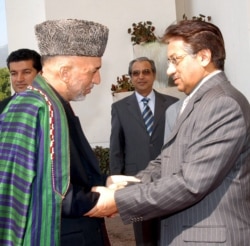 Afghan President Hamid Karzai (left) with Pakistani President Pervez Musharraf in Islamabad in October 2005 (epa)
Afghan President Hamid Karzai (left) with Pakistani President Pervez Musharraf in Islamabad in October 2005 (epa)
ACROSS A DIFFICULT BORDER. The contested border between Pakistan and Afghanistan is some 2,500 kilometers long and runs through some of the most rugged, inhospitable territory on Earth. Controlling that border and preventing Taliban militants from using Pakistan as a staging ground for attacks in Afghanistan is an essential part of the U.S.-led international coalition's strategy for stabilizing Afghanistan. Officials in Kabul have been pointing their fingers at Pakistan for some time, accusing Islamabad or intelligence services of turning a blind eye to cross-border terrorism targeting the Afghan central government. Many observers remain convinced that much of the former Taliban regime's leadership -- along with leaders of Al-Qaeda -- are operating in the lawless Afghan-Pakistani border region.... (more)
RELATED ARTICLES
Pakistan-Afghanistan Conflicts Continue
Karzai, Musharraf Spar Ahead Of Bush Meeting
Musharraf Says Taliban Could Spark Pashtun 'National War'
Afghan Minister Attacks Pakistani Support For 'Terrorism'
Historical Context Of Afghan-Pakistani Relations
Afghanistan/Pakistan: 'Inseparable Twins' In Need Of Separation




